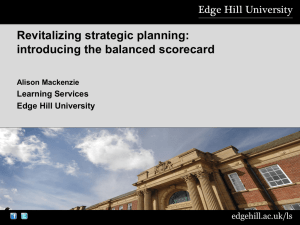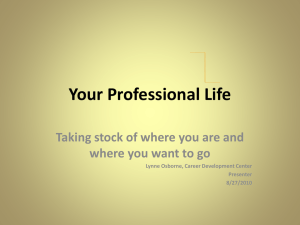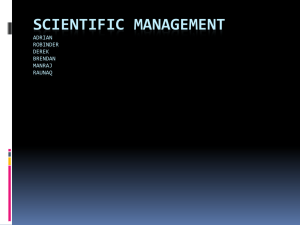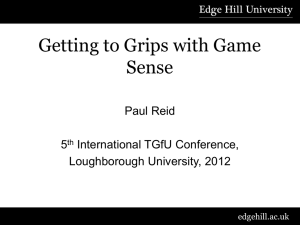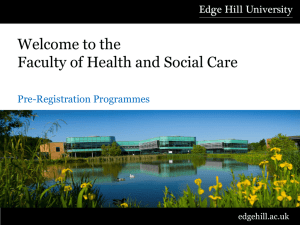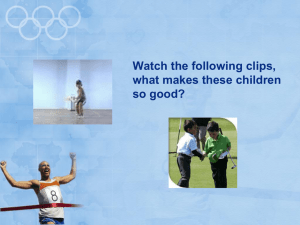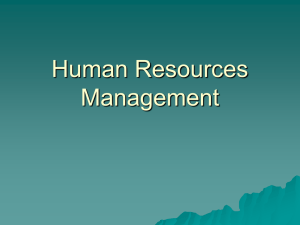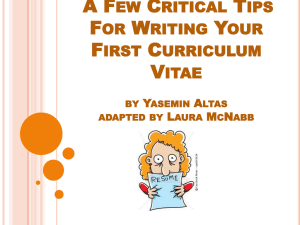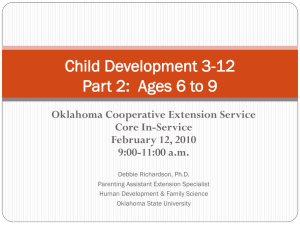Reference Writing and Personal Statement Advice
advertisement
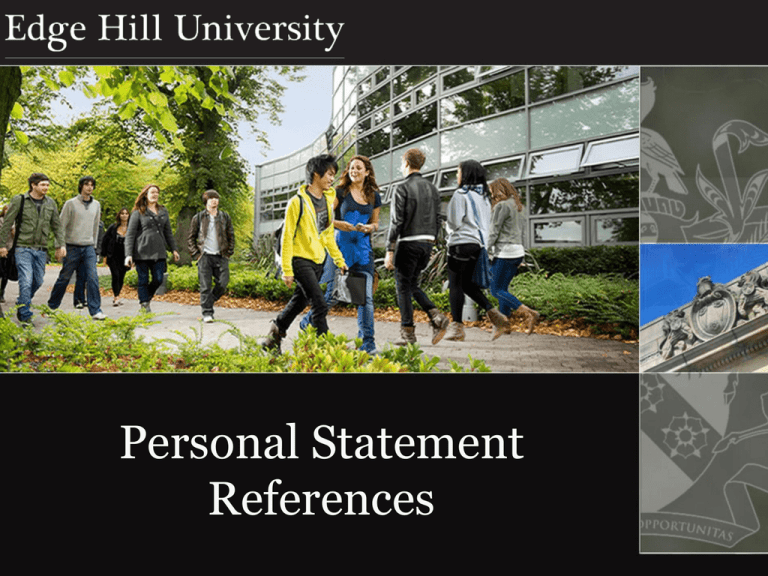
Personal Statement References Aims and Objectives • What Are Universities Looking For? • What to Include in the Reference • School Information • Student Information • Looking at Real Examples • Further Information • Personal Statement Tips What Are Universities Looking For? What Universities are looking for • Potential for success at Higher Education • Fair assessment of the student’s abilities, achievements, skills and attributes • As directly related as possible to the student’s desired career path • Evidence or examples to demonstrate your assessment Suitability of a prospective student A fair analysis of the student in the context of: The course • Skills, abilities and motivations? • What have they done in school to support their choice? Higher Education in general • What they can bring to the university A particular profession or career • Have they done their research? Make it specific Put any important messages at the top of the page Avoid generic statements “We recommend *** to your institution” vs “*** would make an excellent teacher because of her ability to interact and engage with younger children effectively.” Information that might help • The student’s personal statement and application form. • Course prospectus pages and information: • Entry criteria • Desirable student attributes • Courses and institutions the student has applied for. Reference Content School Information Very brief statement of the key information, putting the reference in context of the school/college Prospective Student Information Relevant and important information about the student and their Motivations, Academic abilities and achievements, Skills and abilities, Work Placements, Additional information School Information School Information Keep it brief (A few sentences at the most) For Example: The Sixth Form College offers a range of ALevel and BTEC National Diploma qualifications to 500 sixth form students. approximately 70 of whom go on to university each year. All students take a critical thinking module as part of a non-examined General Studies Programme. 25% of our students come from a widening participation background. Student Information General Tips • Best completed by someone who knows the student. • Make it specific to the student. • Reference to their abilities, strengths and achievements. • Some reports can come from other teachers…but not all. Motivations and ambitions • Proposed career ambitions, attitude, motivation and commitment • Motivation and commitment towards the chosen course or career • Commitment or motivation shown in the school/college context • Suitability for their career choice If you are unsure of the chosen career path of the student, talk about their general suitability for Higher Education Academic Achievement and Ability • General background of academic standard. • Current achievements. • Reference to subjects relating to the courses for which they are applying. • Relevant curriculum enrichment and other activities. • Potential (other than predicted grades). Skills and abilities • Any relevant skills or achievements. • Powers of analysis and independent thought – skills that will be useful in Higher Education. • Qualities or strengths beneficial to their chosen course or career choice. Work Placements • Relevant work experience, such as work placements, voluntary work. • Relevant curriculum enrichment and related skills. • The more competitive the course the more important this element will be. Additional Information Additional information: • Any extenuating circumstances affecting the student or their academic achievements Concerns for or about the student: • Admission tutors are good at reading between the lines Concerns about the student • Information or concerns about a student can be delivered subtly For example: ‘*** is capable of hard work’ could be interpreted as: ‘*** could work hard if they could be bothered, but they can’t’ • Information that can warn a university that a student may need a kick start may be useful Predicted Grades • You do not need to input predicted grades onto the reference unless you are making a particular point. • If the predicted grades are not a reflection of the student’s potential or abilities, this needs to be explained in the reference. Looking at Real Examples Examples of referee references for applications to Edge Hill University Summary • Provide additional information about the student and a fair assessment of the student’s skills, abilities and potential for success in higher education. • Make it specific. • A consistent message between the Reference and the Personal Statement. Further Information Useful Websites www.edgehill.ac.uk www.ucas.com www.ucas.com/advisers/online/references Useful Documents www.ucas.com/documents/ucasguides/ adviserguide2012.pdf Thank you for listening Please feel free to contact us: Daisy Jayes 01695 584258 daisy.jayes@edgehill.ac.uk Chris Bayes: 01695 584198 chris.bayes@edgehill.ac.uk Ryan Duncan: 01695 584 243 ryan.duncan@edgehill.ac.uk Personal Statements Why is it important? • Varying levels of importance on personal statements – the more competitive a course, the more important the personal statement. • For most courses the personal statement and the application are the only things that an admissions tutor will look at to make an offer. • A very strong personal statement can create an offer. What are Universities looking for? o Do we want this student at this university? o Do we want this student on this course? The personal statement should provide all of the information relevant for admissions tutors to make a decision on students’ suitability for the course. What are Universities looking for? • Qualities and Skills • Motivation and Interest • Relevant Experiences • Dedication, Commitment and Enthusiasm • Preparation Top Tips “The statement needs to provoke interest at the beginning, sustain interest throughout, and leave an impression at the end” Admissions Tutor Preparation • Research the courses • • Students need a good awareness of what the course will give them Look at university information • Start Early • Continuous process • Relevant Experience • Test out a career and gain some valuable skills Pick the right course • Will it give students what they want? • Are they prepared for the demands of course? • Career aspirations that match the course. • Can they prove/demonstrate that they want to be on this course? Content • Motivation • Relevant Experience • Academic Ability • Personal Qualities and Attributes • Outside Interests The personal statement Specific • Provide details and examples. • Avoid the generic and boring. Truthful • Modesty can be a good thing. Spelling and Grammar • 19% of Primary QTS Applications are rejected because of poor spelling. Personal Reflection Personal Reflection • Offer thoughts about motivations and lessons learned. • Provide analysis of work experiences and experiences gained. • Reflect on own skills and abilities. Demonstrate and evidence • Provide details and examples to back up claims. • Give examples to highlight important information. Summary • Start the journey as early as possible. • Good preparation is obvious in a personal statement. • Encourage your students to critically analyse their own skills, abilities and experiences. Thank you for listening Please feel free to contact us: Daisy Jayes 01695 584258 daisy.jayes@edgehill.ac.uk Chris Bayes: 01695 584198 chris.bayes@edgehill.ac.uk Ryan Duncan: 01695 584 243 ryan.duncan@edgehill.ac.uk
